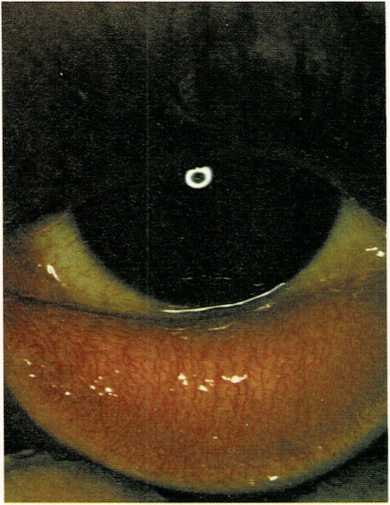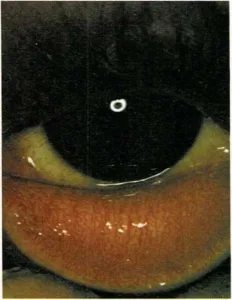Conjunctivitis – Constipation
Conjunctivitis is an inflammation of the membrane covering the
outer, front layer of the eyeball and the lining of the eyelid. It may
be caused by bacteria, viruses, fungi allergies, or chemical irritants
such as smoke or soap. Conjunctivitis usually occurs by itself, but it
may appear in connection with

When a child has conjunctivitis, the lining of the eyelid and the
membrane covering the eyeball become inflamed.
colds, measles, chicken pox, ear infections, and other diseases. Some
forms of conjunctivitis are contagious.
If your child complains of “something in my eye,” look for
conjunctivitis. This feeling is often a first symptom, followed by a
discharge of water or pus, or swelling accompanied by itching, burning,
and discomfort from light. Symptoms are usually more intense in the
evening after the eyes have been used and will vary with the amount of
inflammation. In the morning, a child’s eyelids frequently will be stuck
together from the discharge that has dried during the night. Wash the
eyes open, but apply no other home treatment. If the inflammation does
not clear soon, see your doctor.
Conjunctivitis in newborn babies may be an indication of a serious
problem. Babies often have a chemical conjunctivitis from the eye drops
administered shortly after birth. This condition should last only 2 or 3
days. If your newborn has conjunctivitis that persists past the fourth
day of life or begins in the first few weeks of life, consult your
doctor immediately. [r.o.s.]
See also Allergy; Eye health
Constipation is a bowel disorder in which bowel movements are hard,
dry, and difficult to pass. You cannot tell if your child is constipated
just by watching the child during a bowel movement, because some
completely healthy children grunt, strain, and get red in the face just
before and after they have a bowel movement.
Some parents worry unnecessarily about constipation and become overly
concerned about the “regularity” of their child’s bowel movements.
Babies, like adults, vary a great deal in the frequency of bowel
movements. Most young babies have one to three movements a day, but some
have four or five regularly every day. Occasionally, a breastfed baby
has one bowel movement every two or three days, but breast-fed babies
usually have four to eight movements each day.
Most babies have an occasional, mild episode of constipation with some
discomfort for a day or so. This is common in illnesses with fever.
Usually, no special treatment is necessary except to offer the baby an
extra amount of water.
If your baby’s stools are especially dry, try a few changes in diet.
Cereal may be mildly constipating. If the baby eats other solids, give
more fruit (except bananas). Occasionally, one-half ounce (15
milliliters) of prune juice mixed with an ounce (30 milliliters) of
water will help. Add pureed prunes to your baby’s diet. Begin with two
teaspoons a day. Never give your baby laxatives, suppositories, or
enemas without consulting the doctor.
Occasionally, an extremely hard stool may cause a small tear in the
anus. This may, in turn, cause some pain in the passage of stools and
some bright red blood on the outside of the stools. Consult your doctor
if this occurs.
Quite frequently, older children will be constipated for short periods
of time. Occasionally, this condition represents some resistance to
toilet training, but most often it starts around the age of 2, when
children are learning to exercise their own will and to say “no.” They
even say “no” to their own body needs, ignoring them while they continue
to play. Or they say “no” because they are upset over the arrival of a
new
baby in the house. Never battle over this withholding of stools, because
children who feel they must defend their right to exercise their own
control can become very stubborn. Do not focus undue attention on bowel
habits.
To avoid constipation, your child should have a balanced diet, regular
exercise, and plenty of liquids. Consult your doctor if your child is
persistently constipated, especially if the child resists going to the
toilet and soils underpants repeatedly during the day.
[m.g.]
See also Appetite; Enema; Laxatives;
Nutrition; Suppositories
Contagious diseases. See Communicable diseases; Immunization
Contusions. See Bruises

